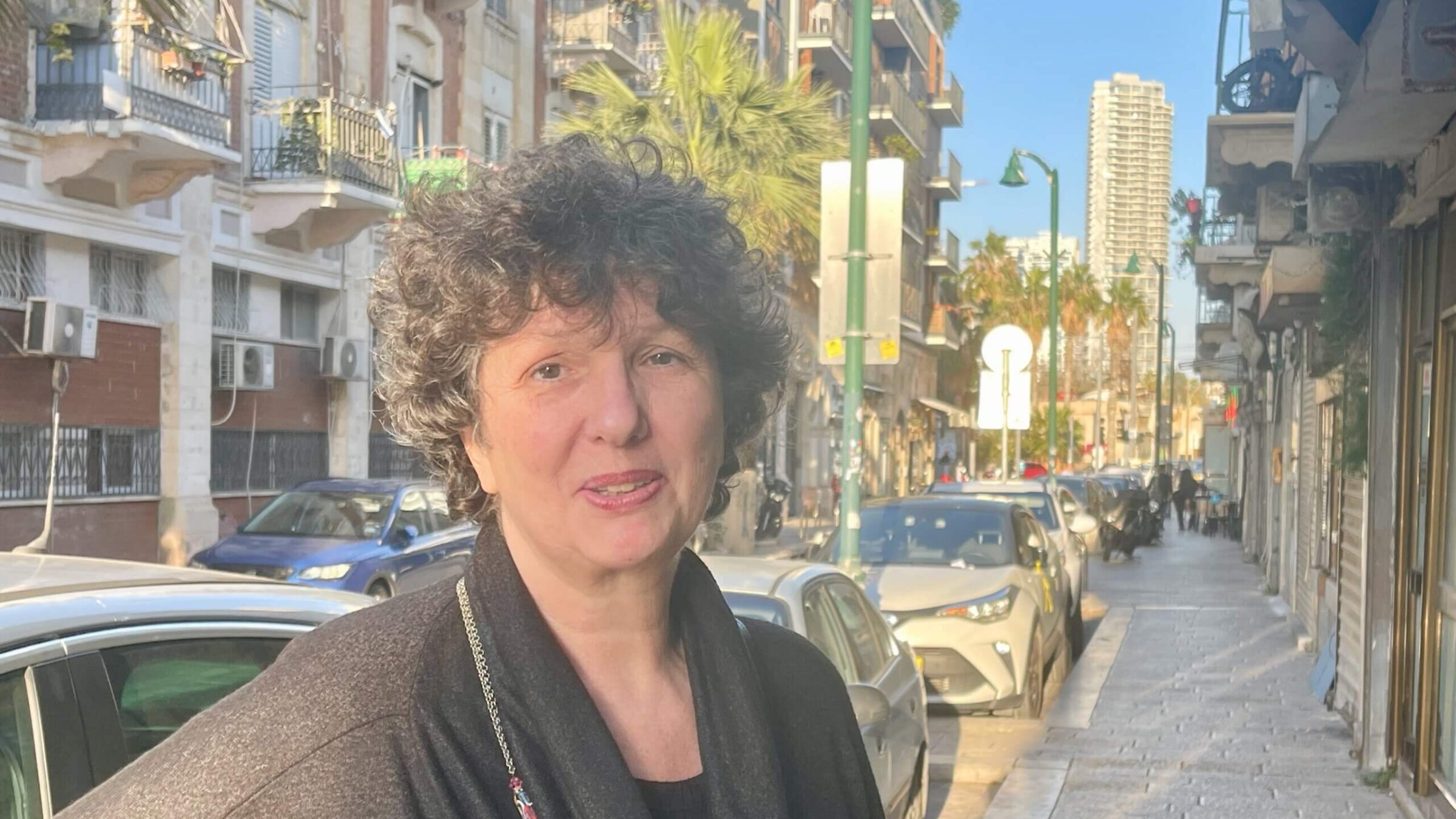‘The war is the last straw’: Secular Israelis fed up with politics and prices think about leaving
After years of stigma, one says, ‘there’s no shame’ in emigration anymore

Sarah Mann of Tel Aviv sees the war as just the latest among many reasons to leave Israel, at least temporarily. Photo by Susan Greene
TEL AVIV – From its inception, Israel stigmatized the idea of its citizens leaving the country. It’s embodied in the Hebrew word for emigrés, yordim, which means those who go down — while those who move to Israel make aliyah, or go up.
That stigma had lifted somewhat in recent years as higher-paying medical, academic and high-tech jobs drew scores of Israelis abroad.
Now, with the Oct. 7 Hamas terror attack and looming regional threats having shaken Israelis’ sense of security, and internal political divisions flaring over fundamental questions like democracy, people are talking about leaving even more openly.
“There’s no shame in it,” said Sarah Mann, a 55-year-old editor in Tel Aviv weighing whether to take a few-months break from the country or leave it altogether. “Are you kidding?” she asked rhetorically. “This is a matter of survival.”
The Israeli government and nonprofits working to promote immigration publicly celebrate the number of people moving here. Unsurprisingly, given the war and protest movement before it, aliyah dropped significantly in 2023, to 45,533 people from 76,616 in 2022. Still, the Jewish Agency says it got 4,715 new requests to open aliyah files in the last quarter of 2023, more than double the same period in 2022.
It is trickier, though, to gauge how many Israelis move away. Many people go abroad at first for six months or a year and end up staying; it can take a while for the government to catch up. The latest publicly available data from Israel’s Central Bureau of Statistics is for 2021, when about 18,200 people moved away for a year or more, fewer than 2020 (20,800) but more than 2019 (15,500) or 2018 (14,000). I could not find any government official or independent group tracking departures since Oct. 7.
In a nation where new opinion polls seem to be published every week, there are also a surprising lack of recent surveys tracking Israelis’ thoughts on moving abroad.
It seems the last poll to ask the question was aired by Channel 13 in July, after the Knesset passed the first judicial overhaul law (which has since been overturned by the Supreme Court). It found 28% of Israelis were weighing leaving the country. The free daily newspaper Israel Hayom published a poll in 2022 showing 69% of Israelis interested in moving abroad for work reasons, up from 46% the year before.
Many Israeli Jews say the Oct. 7 attack — in which thousands of Hamas militants breached the border fence, killed 1,200 people and abducted about 250 — burst any sense of security they felt in this small country surrounded by enemies.
Leemore Landis, an information technology executive who moved here from the New York area 11 years ago, said she was so scared and stressed out by the attack that she fled on the first flight to Sydney, Australia, where her husband is from. The couple and their young daughter returned home to Ramat Hasharon, a coastal suburb of Tel Aviv, in December, but are making plans to move to the U.S. this spring.
“I feel like we Anglos are wired a little differently when it comes to sirens and rockets,” Landis told me. “Neither of us were raised having to deal with these kinds of threats and it’s harder for us to feel totally confident that things will, you know, that things will come out OK.”
Added her husband: “We don’t think we need to sacrifice any support for Israel just because we’re not here.”
Four couples and two individuals interviewed for this story declined to speak on the record about their departures because they fear their family and friends who are staying might find their comments insensitive or disrespectful. All said they are keenly aware that their high-tech jobs or dual citizenships give them options abroad that many of their neighbors don’t have — and three said they feel shame or guilt for packing up and leaving.
“I’m breaking my mother’s heart,” said one, a tech programmer who plans to move to Los Angeles in March. “I can’t look at her without crying.”
But Mann, who was born in Britain, said she was drawn to this country 15 years ago partly for its people’s candor and so it would feel “un-Israeli” not to speak out about why she’s leaving.
“The social contract is broken,” she started. “We live here, pay our taxes here, send our children to the army, take the rough with the smooth. We expect protection from the state. We expect to be kept safe. But clearly the government failed, the army failed, the security mechanism failed and people were burned alive, brutalized, raped.
“Why was there no security on the border of Gaza? Our government betrayed us.”
After months of sleeplessness and a recent panic attack from watching TV news, Mann sublet her apartment on Tel Aviv’s Dizengoff Street last week and plans to head soon to Southeast Asia. She’s not sure how long she’ll stay.
Mann said she has long resented paying the equivalent of $2,100 for a small apartment that her landlord refuses to renovate. She’s also irked that her Shkedia granola costs twice as much here as in London.
And she is fed up with what she calls Netanyahu’s “endless cycle of corruption” as well as the judicial overhaul pushed by his government, the most far-right and religious in Israeli history. She said she is tired of protesting and still angry about the way police roughed her up during a demonstration last year.
Mann is also concerned about efforts to roll back women’s rights in Israel and disgusted by what she sees as a lack of consensus about coexistence not only among Jews and Arabs but also the secular and religious. The death toll in Gaza, now nearing 28,000, weighs on her and she’s weary of staking her future in a nation she sees losing legitimacy internationally.
“The war is the last straw in some ways,” she said. “My friends are all urging me to go and saying don’t come back. Things are that bad here.”
Mann isn’t alone. Shlomit Drenger of Ocean Group, a company that helps people relocate out of Israel, said that safety concerns, cost of living, and political disillusionment are among the top reasons her clients cite.
Drenger said that global companies tend to move Israeli workers to Amsterdam, New York, Texas, California and the Boston area, but that those emigrating on their own seem to gravitate to Cyprus, Greece, Portugal, Spain and Canada.
Maor Wolfsmith, an Israeli native, moved from Tel Aviv to London last August with his longtime partner, a British citizen, and their two young children. He is using a sabbatical from his job as a childhood clinical psychologist and researcher to take a time-out from Israel. But his use of the past tense when describing his life in Israel made me think he’ll probably stay away.
Wolfsmith, who is gay, grew up in Salit, a settlement in the occupied West Bank. He said he “always felt that I’m living in the margins of society,” and that the alienation grew more poignant when Netanyahu allied with right-wing forces hostile to queer people. That faction’s rise in power, he noted, made Judaism feel “tyrannical.”
“So I feel not like I left, but in many ways I’ve been kicked out before I left,” he said. “It felt in Israel like you really had to conform, and it was suffocating, and I didn’t want my children to grow up in that environment.”
He said he has been disillusioned by polls showing strong support across the Israeli political spectrum to prioritize continuing the war in Gaza over clinching a deal to free hostages.
“I was speechless. I felt like what is it? Are they my people? Is this what it means to be Israeli today? To be Jewish?” he said. “There’s no room for me in that version of Israel.”
Alex Paz-Goldman, a retired author and tech executive, also feels squeezed out.
His parents, both Holocaust survivors, came to Israel in 1949 from post-World War II Poland. He grew up believing this was the one place where Jews are safe. Not anymore.
Paz-Goldman, who said he supports a ceasefire, has been particularly vocal about the move by far-right ministers to give more guns to West Bank settlers. He said he feels so threatened by what he sees as right-wing leaders inciting violence against leftist activists that he recently erased months of critical posts from his Facebook feed.
“It is not so much this war or the Arabs that people like me are most scared of right now,” he told me over coffee this week. “It’s the religious Jews who’ve been taking over our country and making us wonder when we may need to flee.
“Israel isn’t turning out to be the nation it was supposed to be. So for ourselves, for our family, people like me need someplace else to go.”
Paz-Goldman, 68, has spent the past three years seeking to become a Polish citizen. Warsaw approved his application about a month ago, and now, with a plan B firmly in his pocket, he is indignant that he may have to use it.
Paz-Goldman knows his late parents would have plotzed at the prospect of him moving back there. And, having traveled to dozens of countries, he is troubled by the fact that it’s the only one where he has faced blatant and aggressive antisemitism.
“The fact that I’m even thinking of leaving my home, my culture, my Hebrew language bothers me more than I can express,” he said. “What am I going to do living in Poland?”
Correction: The original version of this article misstated the surname of the 55-year-old editor from Tel Aviv. She is Sarah Mann, not Wells.

















